11 start with L start with L
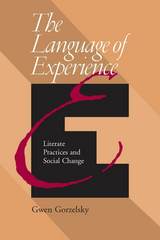
The Language of Experience examines the relationship between literacy and change--both personal and social. Gorzelsky studies three cases, two historical and one contemporary, that speak to key issues on the national education agenda.
"Struggle" is a community literacy program for urban teens and parents. It encourages them to reflect on, articulate, and revise their life goals and design and implement strategies for reaching them. To provide historical context for this and other contemporary efforts in using literacy to promote social change, Gorzelsky analyzes two radical religious and political movements of the English Civil Wars and the 1930s unionizing movement in the Pittsburgh region. Charting the similarities and differences in the function of literate practices in each case shows how different situations and contexts can foster very different outcomes.
Gorzelsky's analytic frame is drawn from Gestalt theory, which emphasizes the holistic nature of perception, communication, and learning. Through it she views how discourse and language structures interact with experience and how this interaction changes awareness and perception.
The book is methodologically innovative in its integration of a macro-social view of cultural, social, and discursive structures with a micro-social view of the potential for change embodied in them. Through her analysis and in her use of the voices of the people she studies, Gorzelsky offers a tool for analyzing individual instances of literate practices and their potential for fostering change.
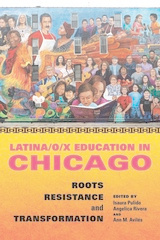
Insightful and enlightening, Latina/o/x Education in Chicago brings to light the ongoing struggle for educational equity in the Chicago Public Schools.
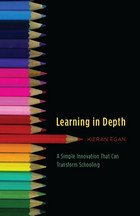
For generations, schools have aimed to introduce students to a broad range of topics through curriculum that ensure that they will at least have some acquaintance with most areas of human knowledge by the time they graduate. Yet such broad knowledge can’t help but be somewhat superficial—and, as Kieran Egan argues, it omits a crucial aspect of true education: deep knowledge.
Real education, Egan explains, consists of both general knowledge and detailed understanding, and in Learning in Depth he outlines an ambitious yet practical plan to incorporate deep knowledge into basic education. Under Egan’s program, students will follow the usual curriculum, but with one crucial addition: beginning with their first days of school and continuing until graduation, they will eachalso study one topic—such as apples, birds, sacred buildings, mollusks,circuses, or stars—in depth. Over the years, with the help and guidance of their supervising teacher, students will expand their understanding of their one topic and build portfolios of knowledge that grow and change along with them. By the time they graduate each student will know as much about his or her topic as almost anyone on earth—and in the process will have learned important, even life-changing lessons about the meaning of expertise, the value of dedication, and the delight of knowing something in depth.
Though Egan’s program may be radical in its effects, it is strikingly simple to implement—as a number of schools have already discovered—and with Learning in Depth as a blueprint, parents, educators, and administrators can instantly begin taking the first steps toward transforming our schools and fundamentally deepening their students’ minds.

Entrepreneurial creativity, private investment, and competition have been among America's great strengths. Can they be harnessed to improve troubled public schools? Or is private management of public schools at best a gimmick, and at worst an undemocratic sellout?
In the 1990s, some failing school systems turned to private education management organizations to manage their schools. The EMOs promised academic improvement to families and profits to their investors. Wall Street and foundations lavished hundreds of millions of dollars on for-profit and nonprofit start-ups, and thousands of students' educations began to be directed not by school officials, but by private companies.
In Learning on the Job, industry insider Steven Wilson, the founder and CEO of Advantage Schools, looks back on the first tumultuous decade of this social experiment. Digging deep into the academic, financial, logistic, and political records of seven leading EMOs, including his own, he reveals the potential and pitfalls of their business and educational models, and their actual successes in the classrooms and the boardrooms. Have they given their students a better education? Can they succeed as businesses? Can businesses in fact run better public schools than school districts?
With remarkable honesty and fairness on an ideologically charged topic, Wilson describes the follies and wisdom, overreaching and real accomplishment, of the first education entrepreneurs. Acknowledging that they had much to learn about the real-world challenges of running schools, he passionately defends the promise of private involvement in public schooling.
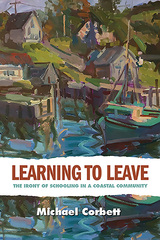
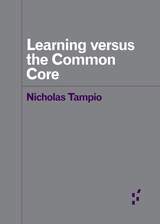
An open challenge to Common Core’s drive for uniformity
Nicholas Tampio watched as his kindergartner’s class shifted from one where teachers, aides, parents, and students worked hard to create a rewarding educational experience to one in which teachers delivered hours-long lectures using packaged lesson plans. Learning versus the Common Core explains how standards-based education reform is transforming nearly every aspect of public education by looking closely at the standards, the agenda of people pushing standards-based reform, and how these fit within a global pattern of education reform. With a nod to the philosophy of John Dewey, Tampio concludes with a vision of what democratic education can look like today—and how people can form rhizomatic alliances across different political and ethical backgrounds to fight the Common Core.
Forerunners: Ideas First
Short books of thought-in-process scholarship, where intense analysis, questioning, and speculation take the lead

Around 10,000 tax dollars will put a child through many public schools for a year. About 10,000 private dollars will put him through prep school. Why, then, is one system troubled and the other thriving, one vilified and the other celebrated? In this book, a renowned historian of education searches out the lessons that private schooling might offer public education as cries for school reform grow louder.
Lessons from Privilege explores a tradition shaped by experience and common sense, and guided by principles that encourage community, personal relationships, and high academic standards. These "basic" values make a profound difference in a time when popular culture, which mocks intellectual curiosity and celebrates mental passivity, competes so successfully for students' attention.
Arthur Powell uses the experience of private education to put the whole schooling enterprise in fresh perspective. He shows how the sense of schools as special communities can help instill passion and commitment in teachers, administrators, and students alike--and how passion and commitment are absolutely necessary for educational success. The power of economic resources, invested fully in schools, also becomes pointedly clear here, as does the value of incentives for teachers and students.
Though the concerns this book brings into focus--for decent character and academic literacy--may never be trendy or easily applied, Lessons from Privilege presents sensible, powerful, and profitable ideas for enhancing the humanity and dignity of education in America.

Liberal arts colleges represent a tiny portion of the higher education market—no more than 2 percent of enrollees. Yet they produce a stunningly large percentage of America’s leaders in virtually every field of endeavor. The educational experience they offer—small classes led by professors devoted to teaching and mentoring, in a community dedicated to learning—has been a uniquely American higher education ideal.
Liberal Arts at the Brink is a wake-up call for everyone who values liberal arts education. A former college president trained in law and economics, Ferrall shows how a spiraling demand for career-related education has pressured liberal arts colleges to become vocational, distorting their mission and core values. The relentless competition among them to attract the “best” students has driven down tuition revenues while driving up operating expenses to levels the colleges cannot cover. The weakest are being forced to sell out to vocational for-profit universities or close their doors. The handful of wealthy elite colleges risk becoming mere dispensers of employment and professional school credentials. The rest face the prospect of moving away from liberal arts and toward vocational education in order to survive.
Writing in a personable, witty style, Ferrall tackles the host of threats and challenges liberal arts colleges now confront. Despite these daunting realities, he makes a spirited case for the unique benefits of the education they offer—to students and the nation. He urges liberal arts colleges to stop going it alone and instead band together to promote their mission and ensure their future.
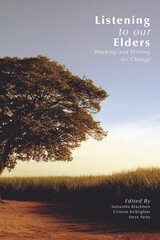
In 2011, the National Council of Teachers of English (NCTE) turned one hundred years old. But our profession is endlessly beginning, constantly transforming itself and its purpose as new voices and identities claim their rights in our classrooms and in our country. The recognition of such claims, however, does not occur without a struggle, without collective work.
Listening to our Elders attempts to capture the history of those collective moments where teachers across grade levels and institutions of higher education organized to insure that the voices, heritages, and traditions of their students and colleagues were recognized within our professional organizations as a vital part of our classrooms and our discipline. In doing so, Listening to Our Elders demonstrates this recognition was not always easily given. Instead, whether the issue was race, sexuality, class, or disability, committed activist organizations have often had to push against the existing limits of our field and its organizations to insure a broader sense of common responsibility and humanity was recognized.
Listening to Our Elders features interviews with Malea Powell (Native American Caucus), Joyce Rain Anderson (Native American Caucus), Jeffery Paul Chan (Asian/Asian American), James Hill (Black Caucus), James Dolmage (Committee for Disability Issue in College Composition), Geneva Smitherman (Language Policy Commitee), Carlota Cárdenas de Dwyer (Latino/a Caucus), Victor Villanueva (Latino/a Caucus), Louise Dunlap (Progressive Caucus), Karen Hollis (Progressive Caucus), Louie Crew (Queer Caucus), William Thelin (Working Class Culture and Pedagogy SIG), Bill Macauley (Working Class Culture and Pedagogy SIG).
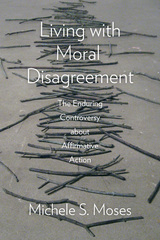
Central to Moses’s analysis is the argument that we need to understand disagreements about affirmative action as inherently moral, products of conflicts between deeply held beliefs that shape differing opinions on what justice requires of education policy. As she shows, differing opinions on affirmative action result from different conceptual values, for instance, between being treated equally and being treated as an equal or between seeing race-consciousness as a pernicious political force or as a necessary variable in political equality. As Moses shows, although moral disagreements about race-conscious policies and similar issues are often seen as symptoms of dysfunctional politics, they in fact create rich opportunities for discussions about diversity that nourish democratic thought and life.
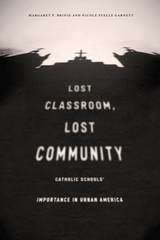
More than just educational institutions, Catholic schools promote the development of social capital—the social networks and mutual trust that form the foundation of safe and cohesive communities. Drawing on data from the Project on Human Development in Chicago Neighborhoods and crime reports collected at the police beat or census tract level in Chicago, Philadelphia, and Los Angeles, Margaret F. Brinig and Nicole Stelle Garnett demonstrate that the loss of Catholic schools triggers disorder, crime, and an overall decline in community cohesiveness, and suggest that new charter schools fail to fill the gaps left behind.
This book shows that the closing of Catholic schools harms the very communities they were created to bring together and serve, and it will have vital implications for both education and policing policy debates.
READERS
Browse our collection.
PUBLISHERS
See BiblioVault's publisher services.
STUDENT SERVICES
Files for college accessibility offices.
UChicago Accessibility Resources
home | accessibility | search | about | contact us
BiblioVault ® 2001 - 2024
The University of Chicago Press









